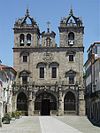
Afonso I, also called Afonso Henriques, nicknamed the Conqueror and the Founder by the Portuguese, was the first king of Portugal. He achieved the independence of the County of Portugal, establishing a new kingdom and doubling its area with the Reconquista, an objective that he pursued until his death.
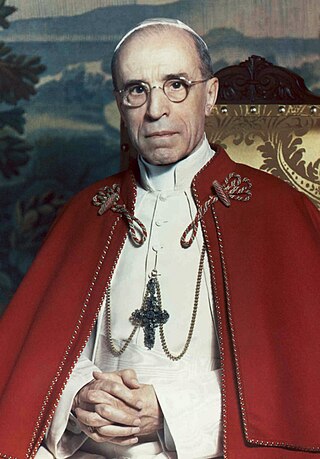
Pope Pius XII was head of the Catholic Church and sovereign of the Vatican City State from 2 March 1939 until his death in October 1958. Before his election to the papacy, he served as secretary of the Department of Extraordinary Ecclesiastical Affairs, papal nuncio to Germany, and Cardinal Secretary of State, in which capacity he worked to conclude treaties with various European and Latin American nations, including the Reichskonkordat treaty with the German Reich.

Braga is a city and a municipality, capital of the northwestern Portuguese district of Braga and of the historical and cultural Minho Province. Braga Municipality had a resident population of 201,583 inhabitants, representing the seventh largest municipality in Portugal by population. Its area is 183.40 km2. Its agglomerated urban area extends to the Cávado River and is the third most populated urban area in Portugal, behind Lisbon and Porto Metropolitan Areas.

The Estádio D. Afonso Henriques is a football stadium in the city of Guimarães, Portugal.
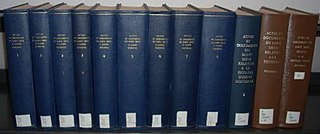
Actes et Documents du Saint Siège relatifs à la Seconde Guerre Mondiale, often abbreviated Actes or ADSS, is an eleven-volume collection of documents from the Vatican historical archives, related to the papacy of Pope Pius XII during World War II.
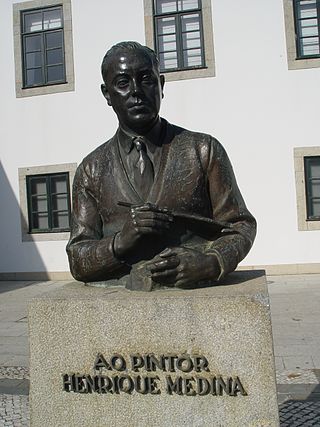
Henrique Medina de Barros was a Portuguese painter, better known as a portraitist.

The Saint Paul Church in Portuguese, Igreja de São Paulo is a Portuguese 16th-century church in Braga, Portugal, dedicated to Saint Paul the Apostle of Jesus.

The Nogueira da Silva Museum is located in Braga, Portugal.

The Stock Exchange Palace is a historical building in Porto, Portugal. The palace was built in the 19th century by the city's Commercial Association in Neoclassical style. It is located in the Infante D. Henrique Square in the historical centre of Porto, designated World Heritage Site by UNESCO.
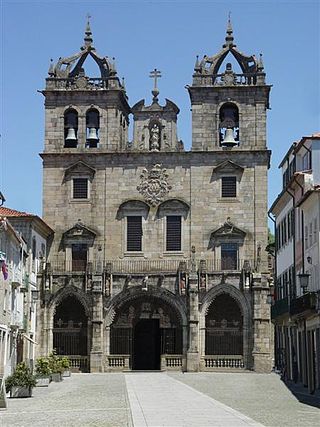
The Cathedral Treasure or Sacred Art Museum is a museum incorporated in the Braga Cathedral in Braga, Portugal.

The Pius XII Museum is located in Braga, Portugal, in the same building of the Museum Medina, as the name from the Pope Pius XII.

The Stringed Instruments Museum in Portuguese: Museu dos Cordofones is located in Tebosa, in the surroundings of the city of Braga, Portugal dedicated to traditional Portuguese string instruments. The museum opened in 1995.

Pope Pius XII consecration of the world to the Immaculate Heart of Mary took place on October 31, 1942. Pope Pius XII performed a Marian consecration, entrusting the world to the Virgin Mary, as Queen of Peace, through her Immaculate Heart.
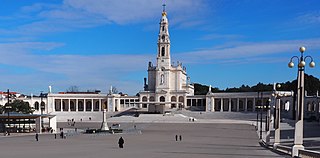
The Sanctuary of Fátima, officially titled Sanctuary of Our Lady of the Rosary of Fátima, is a Marian shrine dedicated to Our Lady of Fatima located in Fátima, in the municipality of Ourém, in Portugal. It consists of a group of Catholic religious buildings and structures with the Basilica of Our Lady of the Rosary as the main building.

Pio XII is a municipality in the state of Maranhão in the Northeast region of Brazil. The city gained international notoriety when Otávio Jordão da Silva, a referee at an amateur football match, was beheaded and quartered after he stabbed a player to death.
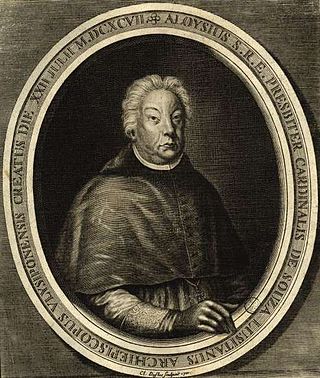
Luís de Sousa was Archbishop of Lisbon. He was a major figure of the second half of the seventeenth century, serving as Royal Chaplain and Councillor of State of Portugal, later being created a Cardinal by Pope Innocent XII in 1697.

Visiting only by booking, the Casa Museu Fernando de Castro is a historical house, located in the city of Porto, Portugal, that belonged to Fernando de Castro, a Portuguese poet, caricaturist, merchant and collector. It contains several paintings from the 17th to the 20th century, sculptures and ceramic pieces. The museum is now under administration of the Soares dos Reis National Museum.
The Eastern Catholic canon law is the law of the 23 Catholic sui juris (autonomous) particular churches of the Eastern Catholic tradition. Eastern Catholic canon law includes both the common tradition among all Eastern Catholic Churches, now chiefly contained in the Code of Canons of the Eastern Churches, as well as the particular law proper to each individual sui juris particular Eastern Catholic Church. Oriental canon law is distinguished from Latin canon law, which developed along a separate line in the remnants of the Western Roman Empire, and is now chiefly codified in the 1983 Code of Canon Law.

Portucalense Infante D. Henrique University (UPT) is a private university in Porto, Portugal.

